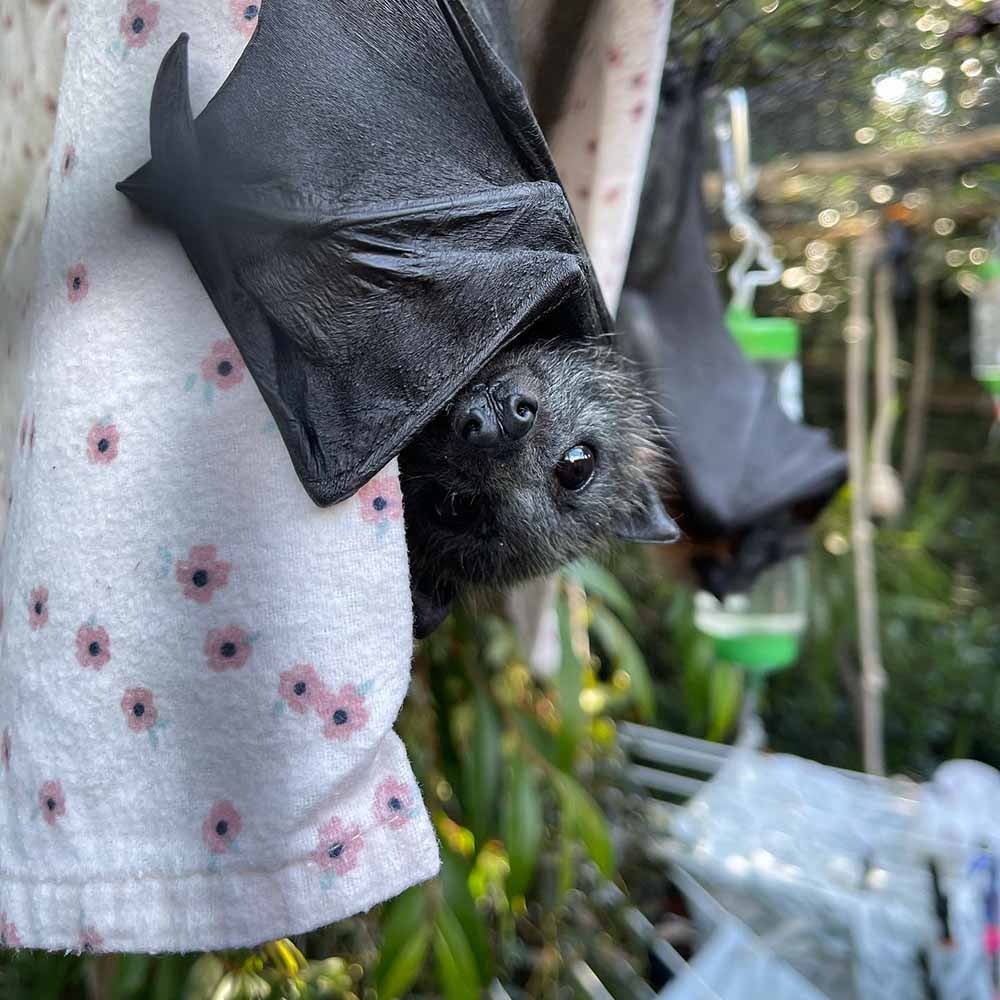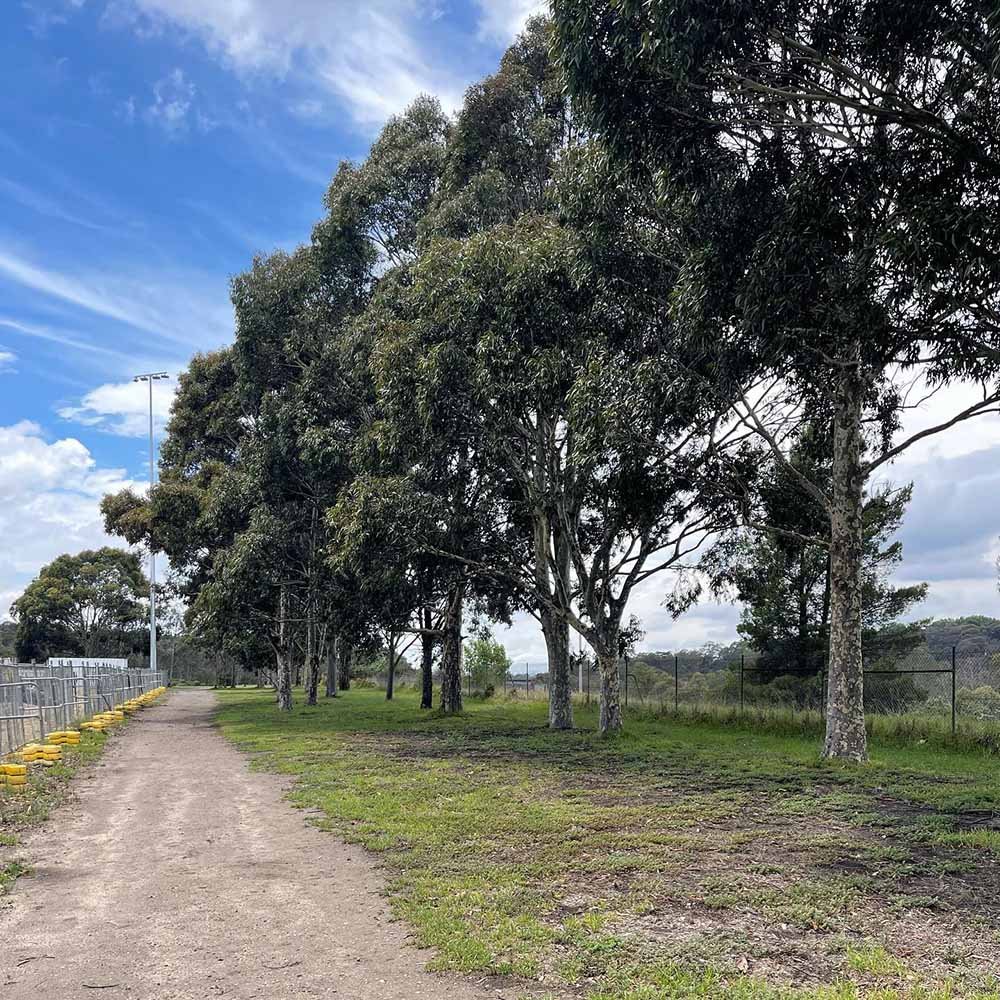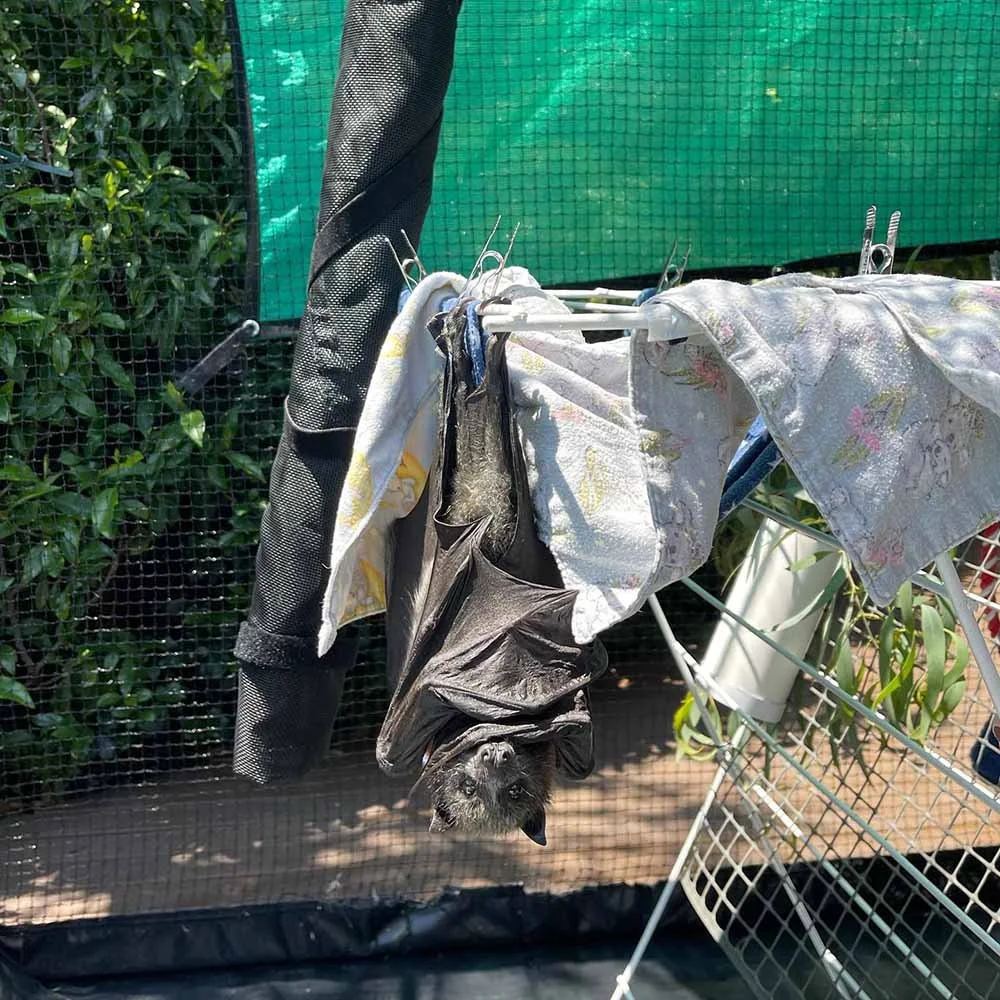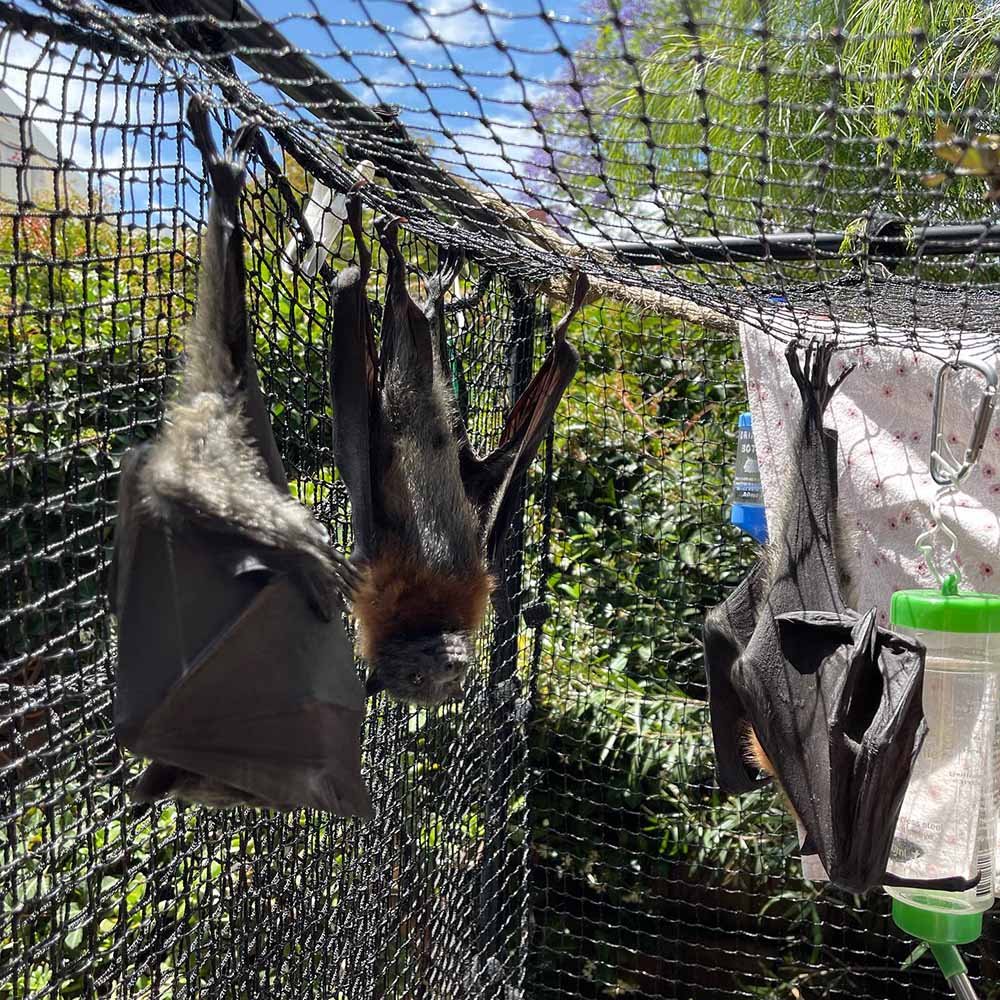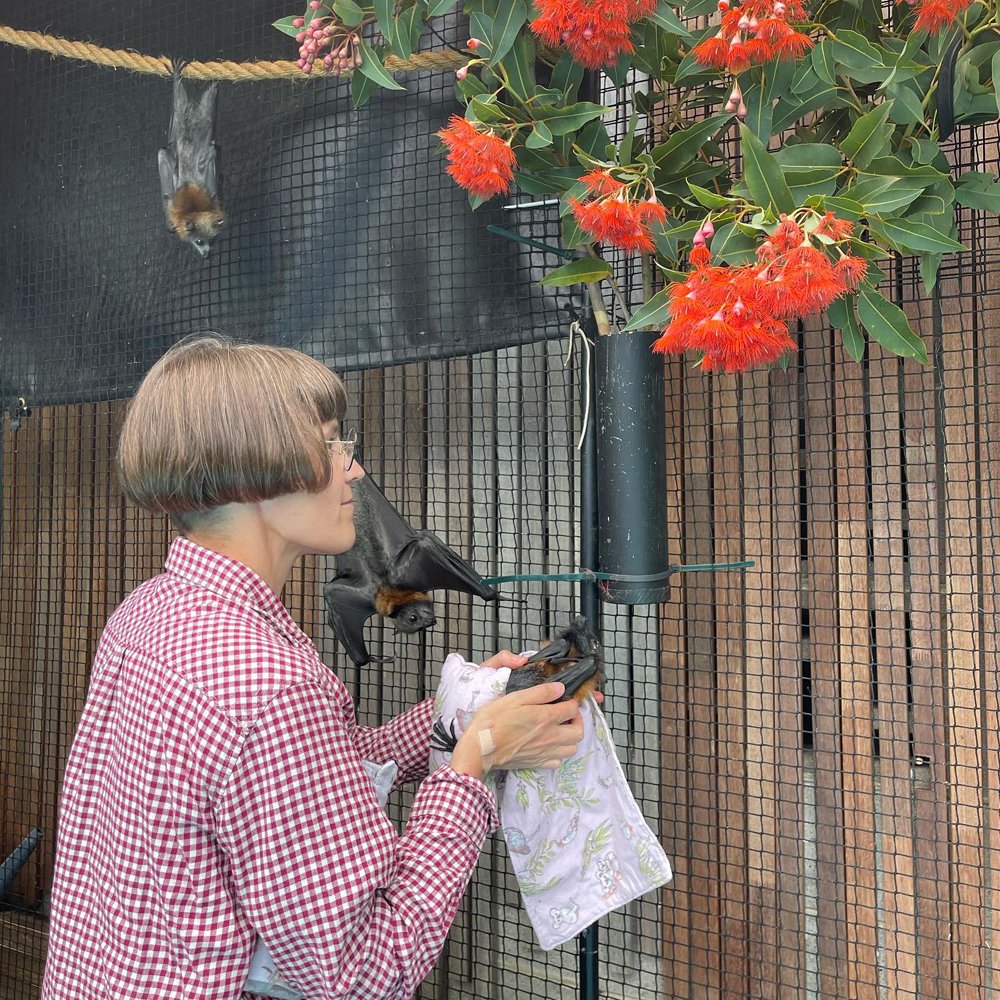Tiny but Wild

Late November — early January, pollinators
Grey-headed flying fox pup season 2023—24
Come December, of course, the outdoor enclosure was a-flutter with budding pups. Zadie, Zelda, Otto, and Sage, quickly ballooned to seven, in a wingbeat, with Otto and his cherry bandage (for a ruptured extensor tendon), the easiest to distinguish at a glance, and Sage*, with her ‘tongy’ intensity, a close second.
At each of Otto’s four feeds, we did physio-style reps on his right side, to help get his muscles used to typical wing movement, as prior to the bandage, he was keeping his wing tucked in. With the bandage**, he moved around the enclosures freely, and stretched and flapped with the others. And upon entering the outdoor enclosure, to soothe Sage, a grape or three was offered, accepted, pulped, and — splat — enjoyed.
From quintet of short-stay visitors to sweet Marigold rescued from the Yarra Bend Colony, can you, from afar, spot who is who? Better still, looking back over the year that was, at all those in our wildlife foster care, can you recall them all?
Press play to rewind time.
* Sage was picked up with a pair of kitchen tongs before she was rescued.
** Otto no longer needs to wear a bandage.
Bringing things to nine, next came two seven-week-old orphans, Kiko and Quinn, followed swiftly by Basil and Bell, two more pups brought into care from the Yarra Bend colony, dehydrated and malnourished (23-days underweight); but four of hundreds who have been located and rescued this season.
As more pups, orphaned due to their mums not returning (because they have become entangled in fruit tree netting, caught on barbed wire, or electrocuted by overhead power lines) or abandoned (owing to the current mass-starvation event, starving mums are abandoning their pups), continue to come into care, please leave your fruit and flowering trees unnetted for them, this season, in particular.
Please share your fruit with our beautiful Grey-headed flying foxes. Habitat destroyed in the fires and habitat clearing is having a disastrous effect upon our wildlife, and our Grey-headed flying foxes are our forests, now and evermore. This small leg up we can give them in our domestic garden spaces means so much.
Australia’s unique biodiversity hinges on the pivotal role played by its four mainland species of flying foxes. These creatures contribute significantly to the preservation of ecosystems by pollinating and regenerating vast areas of bushland. However, the critical situation facing these flying fox populations demands urgent attention.
Starting November 2023, a distressing mass starvation event swept across Queensland, extending rapidly through NSW and Victoria. This crisis struck during a season when female flying foxes were either pregnant or nursing their young, exacerbating the severity of the situation.
Dr. Tania Bishop, WIRES’ Wildlife Veterinarian, underscores the dual catastrophe of starvation and heat stress:
‘We’re witnessing two mass death events at once: starvation and heat stress. Severely malnourished lactating mothers are incapable of nursing their young, and the orphans coming into care are severely compromised. On top of that, flying foxes are terribly vulnerable to extreme heat, especially nursing mums. If they can’t cool down and consecutive days soar above 40 degrees, they suffer from heat stroke, and their internal organs start to fail.’
The repercussions of these events have led to mass fatalities among flying foxes across eastern states and an overwhelming influx of malnourished and heat-affected individuals requiring immediate care. Orphaned pups, in particular, demand intensive, specialised attention, adding immense pressure on wildlife carers already stretched thin.
Continue reading:
‘Flying Fox Mass Death Event: WIRES’ Efforts to Protect and Preserve’
18th December, 2023
@wireswildliferescue
A Boxing Day rescue beneath a tree, next came low Charlie, a ten-and-a-half week-old Grey-headed flying fox pup, near to the Yarra Bend colony, Fairfield side. Charlie came in 19 days underweight. And he, like the others before him, was followed swiftly by another; courtyard Vera joined the group, before the year was out.
While it might not help this season, in addition to sharing your fruiting tree with our Grey-headed flying foxes, you can help strengthen existing green corridors for all wildlife, for seasons to come, through getting involved in planting and weeding days in your area, as well as your own backyard, if you have one.
You can also stick up for Grey-headed flying foxes when you hear people complaining about them and become their champion. As we humans take more and more space, forgetting that we are not separate from nature but a part of nature, we are going to come into increased contact with wildlife in our urban areas. We are going to need to find ways to rub along.
It is not just pups being rescued or in care but adults too; Olive, a female Grey-headed flying fox caught in netting in a fruit tree (replete with a cherry plum traveller that came down with her as we cut her free) is one of many.
Grey-headed flying foxes are particularly susceptible to netting entanglement. As a rule, if you can stick your finger through the holes in the net, it is a hazard to many species of wildlife. (In Victoria, such netting is illegal.)
Over the past six weeks, Wildlife Victoria has recorded a staggering 312% increase in grey-headed flying fox cases when compared to the same period last year.
Grey-headed flying foxes are listed as a vulnerable species under the Flora and Fauna Guarantee Act, but with the increased effects of climate change, ongoing habitat destruction and the loss of food sources they are under Increased threat.
To lose this species, is to lose one of our most important long-range pollinators. Flying foxes spread seeds and pollinate eucalypt forests across long distances, ensuring genetic diversity and the health of our ecosystems.
@wildlifevictoria
15th December, 2023
And though we are in the midst of a terrible season, in very good news, we are excited to share that after being foster carers for the RSPCA since 2017, and wildlife foster carers for Bev Brown of Bat Rescue Bayside since 2020, the two of us and our tiny urban abode are now a licensed wildlife shelter of our own. We are Tiny but Wild! Caring for Grey-headed flying foxes and ringtails, for the main, assorted microbats, and other surprises, like Bingo, the Dusky antechinus, and Peanut, the Bush rat, along the way; all wild and glorious creatures we can care for in our tiny setup with a view to release.
So things will look much the same here, on Marginalia and instagram, really, as none of this would be possible working alone, and as such, we’re still side by side with @bat_rescue_bayside, one dedicated team caring for Grey-headed flying foxes, a connected network, like a forest.
Thank-you Bev and Paul for teaching us everything we know and continue to learn; for taking us under your wing and giving us guidance, hands-on experience, and around-the-clock support; for encouraging us to go for our shelter licence. At the beginning of our journey, we didn’t even think we could work with wildlife, and now our home is one that will continue to be shared with many winged, clawed, and all round splendid marsupials and mammals. What a brilliant turn of the world, that! Thank-you for opening our eyes to the possibilities, and our hearts to the future.
Our offical Department of Energy, Environment and Climate Action (DECCA) inspection was early Wednesday afternoon, and by close of business, we had our licence in writing. We are elated!
Our three oldest pups have also since taken their first big wing beats closer to wild and are now at Bat Rescue Bayside’s crèche, mischief-making in the flight aviary, and socialising with the other pups. They’ve progressed from 5-feeds-per-day formula to fresh fruit buffet bucket bandits in a what feels like both a flash and an age.
Good luck, Zadie, Zelda, and Sage!
Their place not empty for long, of course. Please meet the Woolfs, Virginia and Leonard, bringing the ever-fluid total to 10 pups in care, and two adults, Allegra and Serafina (netting cases). Between them they’ve written a fair few novels and essays, and founded the Hogarth Press, so we hope, with such credentials, they will be able to write themselves out of the current mass starvation event.
This Virginia (pink dummy) and Leonard (apricot dummy) were named by our dear friend Anna (@bibliovita) who was visiting when Lawrence from Friends of Bats and Bushcare arrived on our doorstep with two (of several) malnourished pups rescued from the Yarra Bend colony. When they’re ready, a month or so from now, they, too, will head to Bat Rescue Bayside’s crèche.
Please note: you need to be a qualified, vaccinated carer to handle bats.
Image credit: Walking through the Yarra Bend colony, on the Fairfield side.






